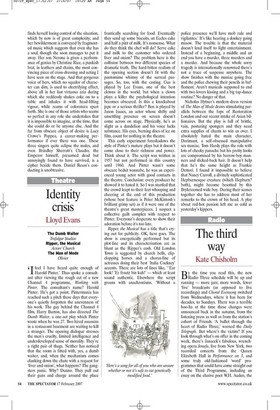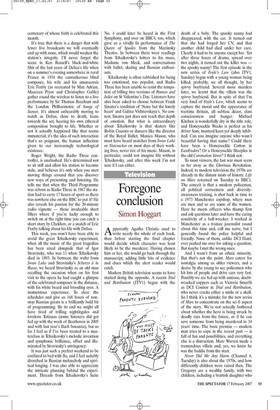The third way
Kate Chisholm By the time you read this, the new Radio Three schedule will be up and running — more jazz, more words, fewer 'live' broadcasts (as opposed to live recordings) and Choral Evensong switched from Wednesdays, where it has been for decades, to Sundays. There was a terrible hoo-ha at the time these changes were announced back in the autumn, from the listening press as well as from the station's cohort of Friends. 'A bullet through the heart of Radio Three,' warned the Daily Telegraph. But where's the victim? If you look through what's on offer in the coming week, there's Janacek's fabulous, wrenching opera Jenufa, live from New York, two recorded concerts from the Queen Elizabeth Hall in Performance on 3, and some truly old-fashioned 'word' programmes that could have come straight out of the Third Programme, including an essay on the elusive poet W.H. Auden, the centenary of whose birth is celebrated this month.
It's true that there is a danger that with fewer live broadcasts we will eventually end up with none, which would weaken the station's integrity. I'll never forget the scene in Ken Russell's black-and-white film of the last years of Delius's life when on a summer's evening somewhere in rural France in 1934 the cantankerous blind composer, his wife and his amanuensis Eric Fenby (as recreated by Max Adrian, Maureen Pryor and Christopher Gable) gather round the wireless to listen to a live performance by Sir Thomas Beecham and the London Philharmonic of Songs of Sunset. It's almost unbearably moving to watch as Delius, close to death, leans towards the set, hearing his own ethereal composition brought to life. Whether or not it actually happened like that seems immaterial; it's the idea of such interaction that's so poignant, the human inflection given to our increasingly technological existence.
Roger Wright, the Radio Three controller, is unabashed. He's determined not to sit still and allow his station to become stale, and believes it's only when you start moving things around that you discover new ways of presenting and listening. He tells me that when the Third Programme was reborn as Radio Three in 1967 the station had to carry 17 hours of sport as there was nowhere else on the BBC to put it! He also reveals his passion for the 20-minute radio vignette — those invaluable short fillers where if you're lucky enough to switch on at the right time you can catch a short story by Chekhov, or a snatch of Eric Fenby talking about his life with Delius.
This week, you won't have been able to avoid the great Tchaikovsky experiment, when all the music of the great tragedian has been aired alongside that of Igor Stravinsky, who was 11 when Tchaikovsky died in 1893. In between the waltz from Swan Lake and Stravinsky's Scherzo a la Russe, we heard Stravinsky as an old man recalling the occasion when on his first visit to the opera he had caught a glimpse of the celebrated composer in the distance, with his white beard and brooding eyes. A momentous experience. To clear the schedules and give us 168 hours of nonstop Russian greats is a brilliantly bold bit of programming. By its end we might all have tired of trilling nightingales and lovelorn Tatianas (some listeners did get fed up with the week of Beethoven in 2005 and with last year's Bach bonanza), but so far I feel as if I've been treated to a masterclass in Tchaikovsky's melodic invention and symphonic brilliance, offset and illuminated by Stravinsky's astringency.
It was just such a perfect weekend to be confined to bed with flu, and I feel suitably drenched in Russian melancholy and spiritual longing. I was also able to appreciate the intricate planning behind the experiment. Threads from Tchaikovsky's Suite No. 4 could later be heard in the First Symphony, and over on BBC4, too, which gave us a vividly lit performance of The Queen of Spades from the Mariinsky Theatre. In between there were readings from Tchaikovsky's letters to his muse, Madame von Meck, and conversations with ballet, skating and Russian enthusiasts.
Tchaikovsky is often rubbished for being too emotional, too populist, and Radio Three has been unable to resist the tempation of billing two versions of Romeo and Juliet on St Valentine's Day. Listeners have also been asked to choose between Frank Sinatra's rendition of 'None but the lonely heart' and Galina Vishnevskaya's. No contest; Sinatra just does not reach that depth of emotion. But what is extraordinary about Tchaikovsky is that skaters like Robin Cousins or dancers like the director of the Royal Ballet, Monica Mason, who must have heard snatches from Swan Lake or Nutcracker on most days of their working lives, never tire of his music. Mason, in particular, could not imagine life without Tchaikovsky, and after this week I'm not sure if I can either.


























































 Previous page
Previous page